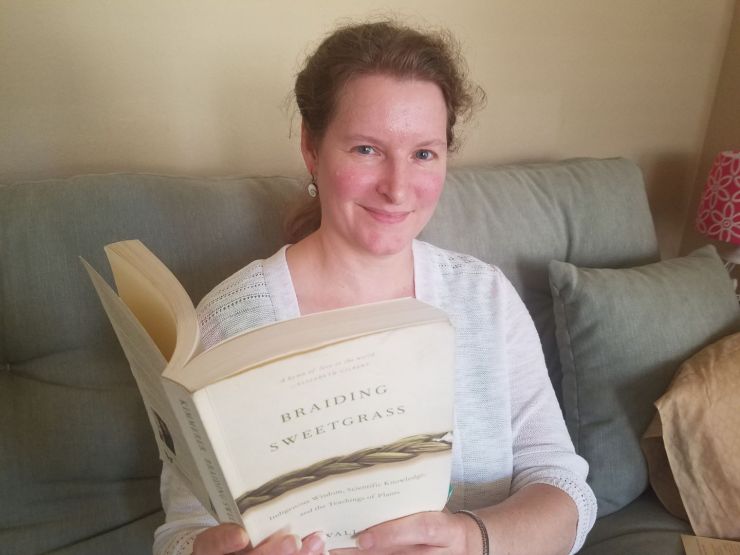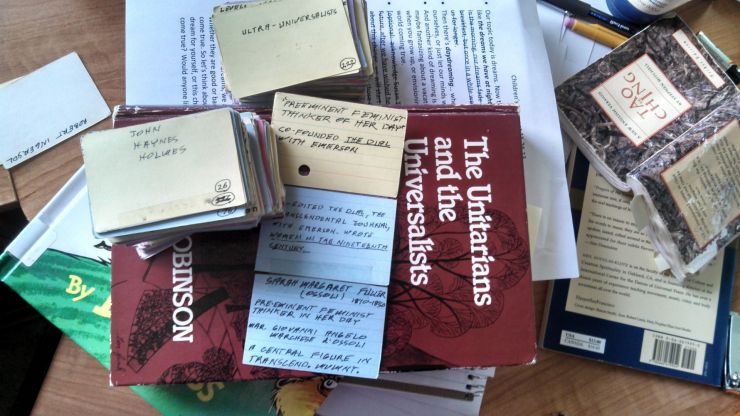Summer Reading List

In a recent “Ask the Minister” worship service, several people asked for book suggestions – for learning about UU history, and for works by people of color and LGBT people today. Here are some picks from Rev. Woodbury for your summer exploration.
Q: What is the best book for illuminating the history and doctrine of the UU church?
A: The Unitarian Universalist Pocket Guide* is a concise introduction to the faith and includes a broad overview of U/U history. (Many online resources give access to U/U history as well, including Harvard Square Library https://www.harvardsquarelibrary.org, the Dictionary of Unitarian & Universalist biography and the Unitarian Universalist History and Heritage Society
Want to dig deeper? In For Faith and Freedom: A Short History of Unitarianism in Europe*, Charles A. Howe traces how Unitarianism developed in multiple European cultures independently – and yet with important connecting threads – as a Christian theology based on “principles of freedom, reason, and tolerance.” “Two Centuries of Universalism” in Universalism in America by Ernest Cassara offers insight into the development of this homegrown American faith and Hosea Ballou’s original A Treatise On Atonement remains a powerful read, laying out the case that no God worthy of the name would condemn his children to hell. The Unitarians and the Universalists by David Robinson is a good choice for a scholarly review of the history of the two denominations. Three Prophets of Religious Liberalism: Channing, Emerson, Parker* includes history-changing sermons and writings of these three seminal figures in Unitarianism, as well as an illuminating introduction by Conrad Wright.
To learn more about UU polity – how we organize and govern ourselves (which is steeped in history and theology) – two go-to resources are Walking Together* and Congregational Polity, both by Conrad Wright. To learn more about how liberal religion spread west from New England, Freedom Moves West: 1852-1951* by Charles Lyttle is a fascinating read. Others may enjoy Prophetic Sisterhood: Liberal Women Ministers of the Frontier, 1880-1930 by Cynthia Grant Tucker, which chronicles the vital role women ministers played in carrying liberal religion into the Midwest.
For a close look at the merging of Unitarianism and Universalism, check out The Premise and The Promise: the Story of the UUA* by Warren R. Ross. If you want to dive deep and explore Unitarian, Universalist and UU history via primary sources, check out the 2-volume work, A Documentary History of Unitarian Universalism.
If you are interested in some other aspect of U/U history, such as Transcendentalism or Humanism or the Empowerment Controversy, please email me for suggestions at minister@westsideuu.org.
* starred titles are available through Westside’s library. To check on whether other titles are in our collection go here)

Q: What are some books by writers of color or LGBTQ writers you would recommend to the congregation?
A: What a great question! I’ll stick mostly with things I can recommend from firsthand knowledge. I have learned a ton from Ta-Nehisi Coates’ writings, including his Between the World and Me (written as a letter from a black father to son) and his articles in the Atlantic – see especially one on housing segregation and the case for reparations. A moving and encouraging read by one of the most inspiring progressive, religiously-rooted activists of our time is the Rev. Dr. William Barber’s The Third Reconstruction: How a Moral Movement Is Overcoming the Politics of Division and Fear. I’m still finishing a compelling book from Robin Wall Kimmerer, of Potawatomi (Native American) descent: Braiding Sweetgrass: Indigenous Wisdom, Scientific Knowledge, and the Teachings of Plants.
A more recent selection for white readers is Robin DiAngelo’s book White Fragility: Why It's So Hard for White People to Talk About Racism (available from its publisher, the UUA’s Beacon Press, as well as other sellers.) I actually haven’t read it yet but plan to soon; colleagues and several Westsiders have endorsed this powerful work, which can help white folks move beyond guilt, shame and fear, and engage more effectively in anti-racist work. If you are intrigued, stay tuned for info about an adult religious education class that several Westsiders are planning to offer at the church, later this summer or fall.
Among other titles, the church library includes Transgender Lives: Complex Stories, Complex Voices by Kirstin Cronn-Mills, which centers the voices of trans people describing their own journeys and identities. It’s a short and engaging read, more of a Trans 101 pick. (Another great introductory source for teens and adults is the site The Genderbread Person.) Westside’s children’s library also contains some wonderful, age-appropriate resources around gender identity and sexual orientation.
For listening, the Code Switch podcast from NPR is excellent. Code Switch is made up of “a team of journalists fascinated by the overlapping themes of race, ethnicity and culture, how they play out in our lives and communities, and how all of this is shifting.” One recent episode explored the controversy over whether it is appropriate to refer to the facilities holding migrant asylum seekers at the southern border as “concentration camps”; another celebrated the 50th anniversary of the Stonewall uprising with an exploration of art from queer and trans people of color. The podcast connects recurring patterns in American life with current events and the experiences of people from many racial and ethnic backgrounds. All the journalists are people of color.
Is watching more your style? Check out Henry Louis Gates Jr.’s PBS mini-series, Reconstruction: America after the Civil War (available on demand via KERA’s Passport program). You can also watch the Ware Lecture from the UUA General Assembly. In 2019, the distinguished speaker was Richard Blanco. Blanco was selected by President Obama as the fifth inaugural poet in U.S. history, and is the youngest and the first Latino, immigrant, and gay person to serve in such a role. Many past years offer inspiring – and challenging – voices of people of color speaking to Unitarian Universalists, including Brittany Packnett last year. (Scroll down from here for the archive.)
If you like the museum scene, you might want to check out the Texas Civil War Museum in White Settlement. I went last year at the suggestion of a colleague; it offers a particular, white Southern perspective that is helpful for transplants getting their bearings in the region’s culture and history to understand. (I would not call it an objective or even-handed treatment.) This year I plan to visit the Lenora Rolla Heritage Center Museum in Fort Worth, a project of the Tarrant County Black Historical and Genealogical Society. Let me know if you’d like to go along… we could make it a church field trip!
Do you have a recommendation for a book (or other resource) by a writer of color or LGBTQ folx that has rocked your world? I’d love to hear it. Drop me a message at minister@westsideuu.org.